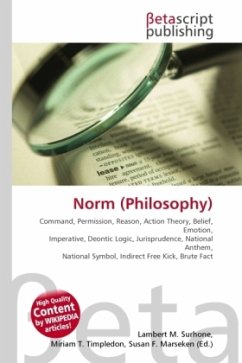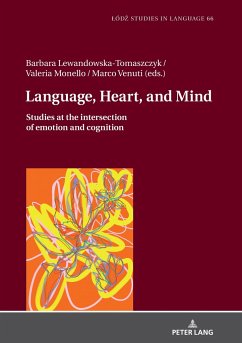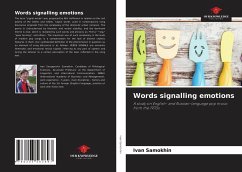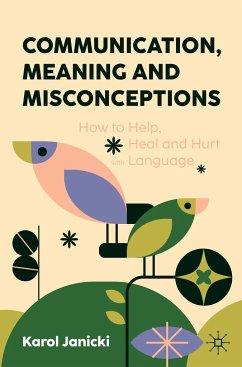
J. Dewaele
Broschiertes Buch
Emotions in Multiple Languages
Versandkostenfrei!
Versandfertig in 6-10 Tagen

PAYBACK Punkte
38 °P sammeln!





Alarge-scale investigation on how multilinguals feel about their languages and use them to communicate emotion. Combining quantitative and qualitative approaches, the author looks at the factors that affect multilinguals' self-perceived competence, attitudes, communicative anxiety, language choice and code-switching.
Jean-Marc Dewaele is Professor of Applied Linguistics and Multilingualism at Birkbeck, University of London, UK. He has published widely on individual differences in psycholinguistic, sociolinguistic, pragmatic, psychological and emotional aspects of Second Language Acquisition and Multilingualism. He is president of the European Second Language Association (2007-2011) and Convenor of the AILA Research Network Multilingualism: Acquisition and Use.
Produktdetails
- Verlag: Palgrave Macmillan / Springer Palgrave Macmillan
- Artikelnr. des Verlages: 978-1-137-35476-1
- 2010
- Seitenzahl: 284
- Erscheinungstermin: 11. August 2010
- Englisch
- Abmessung: 222mm x 145mm x 20mm
- Gewicht: 482g
- ISBN-13: 9781137354761
- ISBN-10: 1137354763
- Artikelnr.: 38475854
Herstellerkennzeichnung
Springer-Verlag GmbH
Tiergartenstr. 17
69121 Heidelberg
ProductSafety@springernature.com
'The book is coherently organised and written in a way that makes it accessible not only to the readers interested in Applied Linguistics, Language Acquisition, Didactics and other fields related to language learning, but also to non-specialists... Jean-Marc Dewaele has made a rewarding contribution to the studies of Applied Linguistics by designing a multidisciplinary study to enquire about the various languages of multilinguals. This can be considered the first large-scale project on the way in which multilinguals perceive their languages and how they use them in communicating both positive and negative emotions.' - Amelia Huzum, Vigo International Journal of Applied Linguistics
'Dewaele's Emotions in Multiple Languages is indeed
'Dewaele's Emotions in Multiple Languages is indeed
Mehr anzeigen
a fine contribution to the research of emotions and languages. The book does not only present viable statistics, but also coupled with real-life accounts from multilinguals, this work is surely an enriching, entertaining and thrilling read.' - Adriell Nicolas, International Journal of Multilingualism
'Emotions in Multiple Languages is an interesting book recommended for both scholars and the general audience. The concepts in the background literature are well defined and explained, the research methodology is consistent, and the analysis of the results is clearly presented. The inclusion of several linguistic examples and the personal experiences of the author, multilingual himself, set the tone of the book and also help the reader to understand the complex nature of multilingualism.' - Eszter Nucz & Zoltán Kövecses, The Modern Language Review
'...this book first of all makes an important contribution to the interdisciplinary domain of the affective sciences. Its significance is defined by the very subject-matter: verbal emotional expression...What makes the book appealing to wider audiences like language teachers or learners is that it is - just like the people it is about - "bilingual", and the second "language" it speaks is that of a carefully individuated interpretation of "experience-near" (Geertz 1984) accounts.' - Anna Ogarkova, International Journal of Applied Linguistics
'Emotions in Multiple Languages is a valuable addition to this line of enquiry, providing a though-provoking overview of the theoretical issues involved in this area...[it] is coherently organized and is accessible to both specialists and non-specialists in Applied Linguistics...The addition of narratives and personal experiences adds richness to the quantitative data and makes the book highly readable. The book's greatest strength, however, lies in its extensive, interdisciplinary overview of the topics, making it invaluable for anyone interested in researching multilingualism.' - Jennifer Brown, Multilingua
'Overall, this study is a great read for anyone interested in language, emotion, or intercultural/cross-cultural communication.' - Marcella LaFever, Journal of Language and Social Psychology
'Emotions in Multiple Languages is an interesting book recommended for both scholars and the general audience. The concepts in the background literature are well defined and explained, the research methodology is consistent, and the analysis of the results is clearly presented. The inclusion of several linguistic examples and the personal experiences of the author, multilingual himself, set the tone of the book and also help the reader to understand the complex nature of multilingualism.' - Eszter Nucz & Zoltán Kövecses, The Modern Language Review
'...this book first of all makes an important contribution to the interdisciplinary domain of the affective sciences. Its significance is defined by the very subject-matter: verbal emotional expression...What makes the book appealing to wider audiences like language teachers or learners is that it is - just like the people it is about - "bilingual", and the second "language" it speaks is that of a carefully individuated interpretation of "experience-near" (Geertz 1984) accounts.' - Anna Ogarkova, International Journal of Applied Linguistics
'Emotions in Multiple Languages is a valuable addition to this line of enquiry, providing a though-provoking overview of the theoretical issues involved in this area...[it] is coherently organized and is accessible to both specialists and non-specialists in Applied Linguistics...The addition of narratives and personal experiences adds richness to the quantitative data and makes the book highly readable. The book's greatest strength, however, lies in its extensive, interdisciplinary overview of the topics, making it invaluable for anyone interested in researching multilingualism.' - Jennifer Brown, Multilingua
'Overall, this study is a great read for anyone interested in language, emotion, or intercultural/cross-cultural communication.' - Marcella LaFever, Journal of Language and Social Psychology
Schließen
Für dieses Produkt wurde noch keine Bewertung abgegeben. Wir würden uns sehr freuen, wenn du die erste Bewertung schreibst!
Eine Bewertung schreiben
Eine Bewertung schreiben
Andere Kunden interessierten sich für













